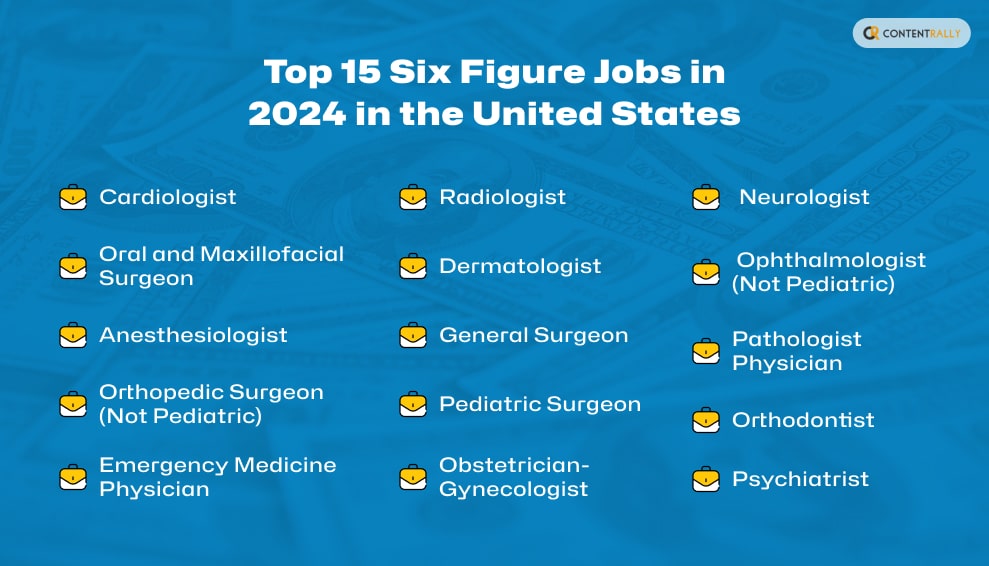Six figure jobs are the ones that pay anywhere from $100,000 to $999,999. Here, the salary number is six digits. For most people, having a six-figure job is a dream. This is because it gives them enough options to be financially secure and have a better lifestyle than most.
In this article, you will learn about jobs that offer six-figure salaries. Here, you will learn about fifteen different jobs from various sectors. Apart from that, you will also get a general overview of six-figure salaries and why they matter. Hence, to learn more, read on to the end of the article.
What Are Six Figure Jobs? – A General Overview

When considering what career you want, you look for the ones that pay a good salary. Here, you might search for a job that has a good salary potential, especially the ones that are called six figure salary jobs.
Basically, a six-figure job is one that has a salary of six figures. That is, the salary ranges from $100,000 to $999,999. Currently, the healthcare sector has some of the highest-paid jobs and a bright future.
Now, you might think that the difference between the two numbers is huge. Also, a big change within this salary range will greatly impact on your financial stability and lifestyle. Moreover, $100K might seem very small compared to $999,999. But even $100,000 per year is a dream for many in the United States.
Hence, starting with jobs that pay 100K a year can be a really good step forward. That is why many people aim to earn a six-figure salary early in their careers. It would help if you did the same, and as you grow and take on more responsibilities in your career, you must negotiate your salary accordingly and increase your income.
The US Bureau of Labor and Statistics (BLS) says there will be significant growth in the healthcare sector in the next few years. Hence, some of the highest-paying occupations in this article will belong to the healthcare sector. Moreover, outside the healthcare field, the best-paying job is for a corporate chief executive.
Top 15 Six Figure Jobs in 2024 in the United States

The following are the top six figure jobs in the United States (as of 2024):
1. Cardiologist
The job of the cardiologist is to treat diseases of the cardiovascular system. These are the surgeons who treat heart conditions. However, being a cardiologist is difficult.
This is because the individual must go through four years of medical school and six to eight more years of specialized cardiology training and general internal medicine training. Apart from that, you also need to clear the American Board of Internal Medicine certification exam.
2. Oral and Maxillofacial Surgeon
These surgeons treat different types of diseases, defects, and injuries around the mouth and the jaw.
Here, it would help if have a four-year dental degree and further specializations.
3. Anesthesiologist
Anesthesiologists are physicians who apply anesthetics and analgesics to manage pain due to surgery. However, since these individuals follow the procedure of operating rooms, they have long work hours. Also, their work is quite unpredictable.
To become an anesthesiologist, you must complete four years of medical school and a four-year residency in anesthesiology. Furthermore, this system might change depending on your specialization.
4. Orthopedic Surgeon (Not Pediatric)
The job of orthopedic surgeons is to perform surgery for rheumatic and other similar diseases. Generally, these individuals work in hospitals or private clinics. Hence, the schedule can be hectic and lengthy.
To become an orthopedic surgeon, you must go to medical school after graduation. Moreover, you also need to spend time in a surgery center and then get a state certification.
5. Emergency Medicine Physician
Generally, the job of emergency medicine physicians is to make on-spot medical decisions to treat serious injuries or prevent deaths. Since these individuals must act immediately, the job can sometimes be extremely hectic.
To become an emergency medicine physician, you need to complete a four-year medical school after graduation. Afterward, you must complete a four-year residency as an ER physician. Also, it would help if you cleared a licensing exam post-residency.
6. Radiologist
The job of a radiologist is to diagnose and treat injuries and diseases using technologies like Magnetic Resonance Imaging (MRI), X-rays, Nuclear medicine, and Ultrasound. Here, the individual mainly needs to work in an official setting. Here, they interpret reports and images, as well as recommend diagnoses.
However, you must spend thirteen years in education to become a radiologist. Here, it would help if you had a bachelor’s degree, followed by medical school, residency, and fellowship. Also, you need a license and board certification.
7. Dermatologist
People go to dermatologists when they face problems with skin, hair, and nails. The job of a dermatologist is to perform dermatological and medical surgery functions. Basically, a dermatologist might practice privately or might be a part of a hospital.
Dermatologists get a bachelor’s degree followed by a medical one like other physicians. After getting a specialization, these individuals must go through three to nine years of internship. Moreover, there is also a need for a state-level certification.
8. General Surgeon
The job of an experienced general surgeon is also among the various six figure jobs. Here, you need to review X-rays and other reports and communicate with the patient about diagnostic procedures. If necessary, you must prepare for surgery and complete it with the help of other surgeons.
Like other healthcare professionals, you need to complete four years of medical school after graduation. Additionally, you need a three-year residency and a multi-year internship in the surgery department.
9. Pediatric Surgeon
There is a need for a pediatric surgeon when there are fetal abnormalities, birth defects, injuries, and diseases. Apart from that, pediatric surgeons also treat newborns and infants. They generally work at children’s hospitals. If not, they work privately. However, there is mostly a team of professionals working together.
To become a pediatric surgeon, you must complete five years of adult general surgery after completing your medical school. After that, you have to complete additional training in pediatric surgery for two more years, followed by certification.
10. Obstetrician-Gynecologist
According to WebMD, “Obstetricians focus on pregnancy and related health issues, while gynecologists focus on general reproductive health. These two types of medical professionals work together closely.” These healthcare professionals also diagnose and treat problems that happen in the female reproductive system.
To become an Obstetrician or Gynecologist, you must complete an obstetrics and gynecology residence program after completing your bachelor’s degree and graduation.
11. Neurologist
A neurologist specializes in disorders of the brain and the nervous system. For example, they treat Alzheimer’s disease, amyotrophic lateral sclerosis (ALS), and epilepsy. However, due to subtle surgeries and pressure situations, the job can be hectic at some times.
If you want to be a neurologist, you must complete your four-year medical degree and pass the MCAT exam. After that, you need neurological surgery residency along with board certification and licensure.
12. Ophthalmologist (Not Pediatric)
An opthalmologist helps treat diseases and eye problems. Apart from that, they also offer vision solutions to treat eye problems. These also include glasses and contacts. Generally, ophthalmologists work privately. They not only see patients in their offices but also perform surgery.
It would help if you also had a bachelor’s degree and a four-year medical degree. After that, you must complete your internship between three and eight years. Moreover, after passing the state medical board exam, you can apply for a medical license.
13. Pathologist Physician
Pathologists are those doctors who diagnose diseases and conduct laboratory testing using tissues, body fluids, and organs. Most of them work in clinical labs, hospitals, and clinics. However, depending on the type of work, pathologists might have pressure work situations.
14. Orthodontist
They work to provide corrective measures for the teeth. Hence, they often receive referrals from patients as well. To deal with teeth problems, these doctors look at reports, apply braces and mouth guards, and offer other treatments for the teeth.
To become an orthodontist, you need to complete your dental school program. Furthermore, you must also get clinical experience for a few years to get your license.
15. Psychiatrist
The job of a psychologist is to treat issues related to mental health. However, there are certain specialties for psychologists, depending on what they want to treat. While some of them work on children, others work on consultation, forensics, addiction, psychoanalysis, and many more.
Bottom Line
As you can see, the top 15 six figure jobs are all in the healthcare sector. Hence, if you want to get a six-figure salary at a job early on, you must get one of these specializations. You can do that after you get a medical degree and residency as a healthcare specialist. Furthermore, you also need to get a license to practice.
Do you have more suggestions on the best six-figure jobs? Consider sharing your information in the comments section below.
Read Also:






















